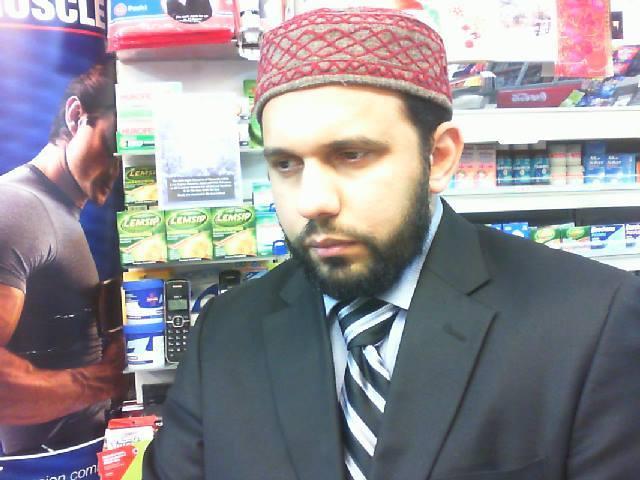Asad Shah’s last message was one of peace.
“GOOD FRIDAY AND VERY HAPPY EASTER ESPECIALLY TO MY BELOVED CHRISTIAN NATION X !” he wrote Thursday, in a characteristically all-caps and emoticon laden Facebook post. “… Lets Follow The Real Footstep Of Beloved Holy JESUS CHIRST (PBUH) And Get The Real Success In Both Worlds xxxx.”
That night, the much-loved Glasgow shopkeeper was found lying in a pool of blood on the road near his store, the victim of a brutal stabbing. He was declared dead on arrival at the hospital shortly after, according to the BBC.
Now, as seemingly the entirety of Glasgow mourns his death — Scottish First Minister Nicola Sturgeon attended one of the many vigils in his honor — police are trying to unravel the “religious prejudice” they say motivated his killing.
Like Shah, the 32-year-old man who has been arrested and charged with the murder is Muslim. But Shah and his family are members of the Ahmadiyya community, a sect that stresses religious tolerance but is often seen as heretical by mainstream Muslims. Citing an unnamed police source, the Scottish Daily Record reported that Shah’s alleged killer may have driven 200 miles from Bradford, in England, after taking offense at Shah’s religious messages on social media. He is reported to be a Sunni Muslim — the largest denomination of Islam.
The arrested man is due to appear in court Tuesday, the Telegraph reported. Authorities have not publicly confirmed that news report or been more specific about a motive.
Meanwhile, Glasgow is reeling from the sudden and unexpected spasm of violence. Of all the possible targets of zealotry, Shah seemed an unlikely one. He was a Pakistani immigrant who wholeheartedly embraced his adopted home — the banner image on his Facebook page is a white and blue road sign that reads “Welcome to Scotland.” He was a devout Muslim who happily wished his Christian customers well on their holidays. He was a 40-year-old man who took the time to learn the name of every teenager who stopped into his store. If anything, Shah seemed the embodiment of tolerance and goodwill.
“You could be any color, that would not be an issue for him, he just cared too much,” 17-year-old Aleesa Malik told the BBC. “He would want to know how are you, what are you doing. He took an interest in everyone’s lives — old, young, anyone.”
His attitude won him almost universal affection in his neighborhood, called the Shawlands (but which he joked was really “the Shahlands, according to the Telegraph). Isabella Graham, whose daughter once worked for Shah in his shop, told the BBC he was an “amazing, wonderful man.”
“Nobody in Shawlands would have a bad word to say about him,” she continued. “I can’t believe he’s gone.”
Regard for Shah runs so deep that a GoFundMe page set up by four young patrons who said they visited his shop daily has raised almost 90,000 pounds (about $141,000) for his family. Vigils organized in his honor over the weekend drew hundreds of mourners. Flowers, cards and other offerings festooned the sidewalk where his body once lay.
But Shah’s killing has also raised alarms on Glasgow’s Southside.
“This ironic tragedy,” one mourner wrote on the GoFundMe page, “The death of a man who loved all, despite religion. Yet murdered, it appears, because of it. Feeling both sad and sickened at this man’s life being stolen so brutally.”
Salah Beltagui, director of the Muslim Council of Scotland, told the BBC that Shah’s death has left the Muslim community feeling anxious.
“People are really shocked and very, very distressed that something like this has happened,” he said. “After this event, our message is that everyone should keep calm and try to get together in recognition of being human beings.”
Shah’s family, meanwhile, say they’ve been warned by police that they might still be a target. Speaking to the Sunday Herald, a family member said, “we have been advised by police not to talk about it, particularly about our names and locations, because there is a security threat.”
“Actually, we cannot describe what we are going through,” the family member continued. “We are heartbroken.”
According to the Sunday Herald, most of Scotland’s 500-strong Ahmadiyya community worships at the Bait-ur-Rahman mosque in Glasgow’s West End. Imam Daud Ahmad told the newspaper that Ahmadi Muslims are sometimes targeted because of their belief that their sect’s 19th century founder, was a prophesied reformer.
“They hate us because we have brought a message they cannot digest … but it doesn’t mean somebody should be murdered,” he said.
The city’s central mosque — whose worshippers are Sunni — also issued a statement condemning the killing: “This type of criminal behaviour is abhorrent and unacceptable,” it read, according to the Herald. “The Mosque stands shoulder to shoulder with all communities in order to eradicate this kind of intolerance from our society.”
According to the Scotsman, Assistant Chief Constable Ruaraidh Nicolson and the National Police Chiefs’ Council head for race, religion and belief, issued a letter to the Glasgow community promising to deal “swiftly and strongly” with any “sectarian conflict, hatred or extremism”.
The Shawlands’ ordinary residents, meanwhile, have issued their own statement of sorts on the issue. Among the flowers and mostly-melted candles that littered the ground where neighbors kept vigil this weekend, someone laid a large painted sign.
It read: “This is not who we are.”
The Washington Post














